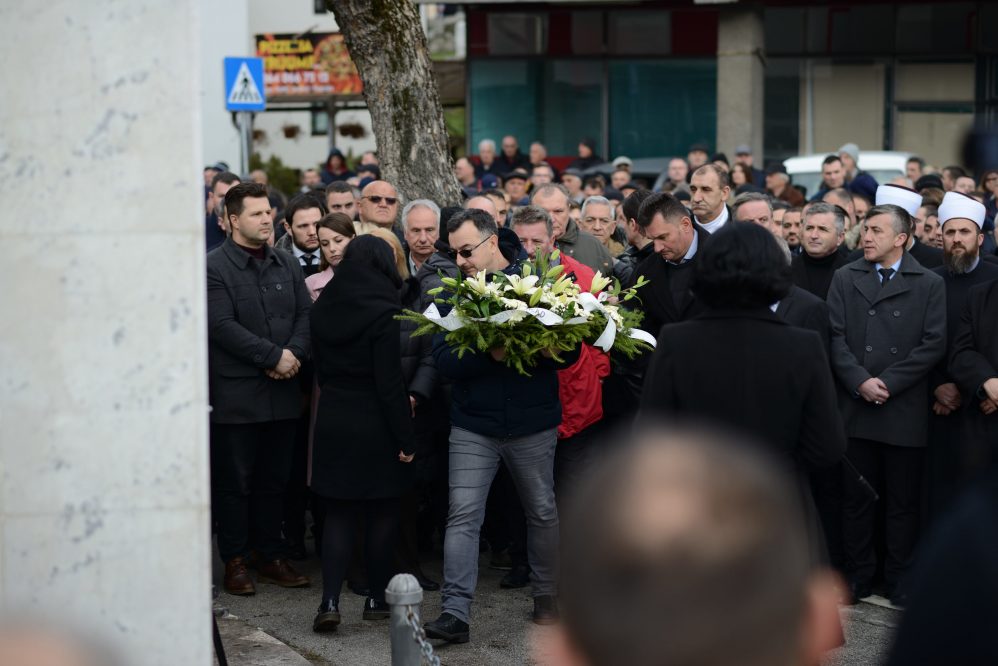At the invitation of the Prijepolje Municipality, a mixed group of veterans from the region attended the commemoration dedicated to non-Serb civilians taken off the train in Štrpci on today’s date 27 years ago.
Veterans of the Army of the Republic of Bosnia and Herzegovina (ARBiH), the Croat Defence Council (HVO), the Croatian Army (HV), the Army of Republika Srpska (VRS), the Army of Yugoslavia (VJ) and the Yugoslav People’s Army (JNA), together with activists from the Centre for Nonviolent Action Sarajevo/Belgrade, took part in the commemoration in Prijepolje and honoured the civilians killed after they were taken off the train in Štrpci, expressing their solidarity and support for the families of the victims and calling for the prosecution of those responsible and for finding the remains of the victims.
“Today, we are in Prijepolje with a mixed group of war veterans from almost all the armies that participated in the wars of the 1990s in the former Yugoslavia. We are here to honour the victims who were taken off the train in Štrpci at this commemoration dedicated to them in Prijepolje. We are here to show solidarity with the families and friends of the victims, as well as the entire local community affected by this crime. We are also here, together, to convey the message and say that conflicts and hostilities can be overcome, and that the only way to do this is through dialogue and trust building. We want to set an example to show that the war is over and that families of victims should be supported by responsible institutions, in this case to find the remains of 16 victims, and also that the prosecutors and judiciary should do everything in their power to prosecute the commanders responsible for this crime,” said member of the Centre for Nonviolent Action and war veteran of the Army of RBiH from Zavidovići Amer Delić.
It has been 27 years since the crime in Štrpci when members of the paramilitary formation “Osvetnici” led by Milan Lukić intercepted train 671 on the Belgrade – Bar railway at Štrpci and took off twenty non-Serb passengers, citizens of what was then the Federal Republic of Yugoslavia, and subsequently killed them at Višegradska Banja, on the territory of Bosnia and Herzegovina (BiH). The victims were citizens of Prijepolje, Bijelo Polje, Belgrade and Podgorica. The oldest was 59 and the youngest 16 years old. To date, the remains of only four victims have been found.
The war veterans were joined by Nail Kajević, brother of the killed Nijazim Kajević, who told the group about the tragedy endured by his family, sharing details of the crime and his endeavour over the years to find justice, that is, to find the remains of his brother and the other victims and to make sure that the commanders of the crime are prosecuted.
“Our message is that what happened at the station in Štrpci must never be forgotten and never repeated. Citizens of my own country were taken away and then as a member of the same people, it is very difficult for me and I feel uncomfortable because after 27 years their remains have not yet been found. When people lose the ability to reason, violence ensues, and this is just more proof that war is the scourge of humanity. Our message is, among other things, that no violence is ever justified and we must never allow it to be repeated,” said Novica Kostić, a JNA veteran from Vlasotinac.
After attending the Commemoration “Štrpci without graves” and the silent procession and laying of flowers at the memorial in Šarampovo near the Old Bridge on the Lim river, the war veterans and peace activists met with representatives of local government in Nova Varoš and representatives of veterans’ associations from Nova Varoš and Prijepolje. They presented their activities in peace and trust building, as well as their long-standing joint actions with war veterans from the region, expressing their wish and explaining the need to continue and deepen cooperation.
“It is a great misfortune that this crime was committed. Our message is that this kind of crime must never happen again, especially when it takes the lives of civilians, people travelling in their own country, returning home from their places of work, people who were not part of any military formation. It is sorrowful that someone so brutally took their lives and never answered for it. I would like to appeal to everyone, from this place and this perspective, as a veteran of the Army of Republika Srpska, if anyone knows where the bodies of the victims are, please come forward with the information so that the families can find peace, so they have somewhere to go to mourn their loved ones,” said Đoko Pupčević from Šamac, a disabled war veteran of the Army of Republika Srpska, now a peace activist.
Since 2008, the peace organisation Centre for Nonviolent Action, with offices in Sarajevo and Belgrade, has been organising visits by groups of war veterans from Croatia, Serbia and BiH to sites of atrocities against civilians and soldiers committed in the recent war and to official commemorations honouring victims, organised by local and state authorities and victims’ associations.
Under the organisation of the Centre for Nonviolent Action, veterans from the region have attended commemorations in BiH in Gornji Vakuf, at Site 715 near Zavidovići, in Stog near Vozuća, in Novi Grad/Bosanski Novi, Sanski Most (Hrastova glavica), Sijekovac near Brod, Laništa near Brčko, Trusina near Konjic, Stupni Do near Vareš, Ahmići in Vitez, Grabovica near Mostar, Skelani near Srebrenica, and in Serbia in Grdelička klisura near Leskovac, Varvarin near Kruševac, Aleksinac, as well as in Croatia in Pakrac, Varivode and Gošić near Knin.

